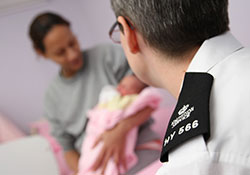Women's health

Department of health, London
As part of its efforts to draw more attention to the specific needs of women in prison, WHO/Europe participated in the development of the new United Nations rules for the treatment of women prisoners.
Most prisoners in all countries in the WHO European Region are men. Because women prisoners are just a small minority of the prison population (2–9% worldwide, on average), their needs are often either ignored or hidden in the male-oriented prison system.
To make a few comparisons with male prisoners, women prisoners are on average less educated and are more likely to be imprisoned for a non-violent, property- or drug-related offence. They have different physical, mental and emotional needs, e.g. relating to drug dependence, mental health, history of violence and sexual abuse, hygiene requirements and sometimes pregnancy. Research indicates that women prisoners are also more likely to suffer from certain mental problems, drug dependence and a tendency to self-harm than male prisoners. In addition, women’s imprisonment in general has more severe effects on families than male imprisonment, especially when women are the sole caretakers for children.



